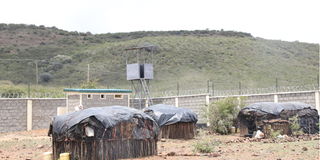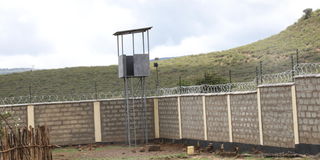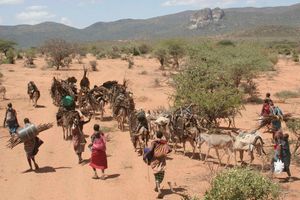
Lorian fortified rangers' camp in Samburu North. The concrete walled camp with raised watchtowers operates around the clock, with community rangers working on rotational shifts to prevent cattle raids.
Before dawn breaks over the rugged Angata Nanyekie plateaus in Samburu North, a team of local rangers together with National Police Reservists (NPR) scans the horizon through a watch tower in Lorian fortified security camp.
Their outpost—a concrete reinforced camp encircled by razor wire—is one of eight fortified bases constructed by Samburu County to deter cattle raiders and armed gunmen who have been terrorising Samburu pastoralists for decades.
This is the new frontline in Samburu's fight against constant cattle rustling and banditry—a network of fortified security bases strategically placed to disrupt the deadly raids.

Lorian fortified rangers' camp in Samburu North. The concrete walled camp with raised watchtowers operates around the clock, with community rangers working on rotational shifts to prevent cattle raids.
For years, gunmen have been exploiting the vast, unforgiving terrain to stage deadly cattle raids, then vanishing deep into Malaso and Suguta Valley that offer a perfect paradise for the raiders.
The concrete walled camps with raised watchtowers operate around the clock, where officers work on rotational shifts in a bid to maintain constant vigilance.
"Bandits often strike at night or early morning, where they hope to catch herders off-guard," explains James Lekuk, a local ranger in Lorian rangers’ camp.
"But with these raised watchtowers, we can see them before they even climb up the valleys into grazing areas."
The security forces rely on a mix of surveillance, knowledge of the terrain and informants within local communities who usually provide tips on planned raids.
Last week, rangers thwarted a major cattle raid in Morijo and Mlima Blue areas, Mr Lekuk said.
Locals say the fortified camps have improved security in the area. The rangers in the fortified security camps work closely with the police to tame banditry.

Lorian fortified rangers' camp in Samburu North. The concrete walled camp with raised watchtowers operates around the clock, with community rangers working on rotational shifts to prevent cattle raids.
Samburu Governor Jonathan Lelelit said the establishment of the security camps is one of the measures his administration has put in place to end endemic cattle rustling.
"My administration will also facilitate efforts to maintain peace and security in affected areas," he said, adding that there can be no development without peace.
In the past one year, banditry has remained a security challenge that has terrorised communities, killed and displaced thousands and hindered socio-economic development. The bandits even began attacking motorists using the Maralal-Baragoi highway.
Meanwhile, the Ministry of Interior and National Administration is seeking increased funding to improve security and development efforts in the banditry-prone north rift region encompassing the counties that were mapped as “dangerous and disturbed”.
Earlier, the government had mapped dangerous gorges, ravines, escarpments, and hills in Baringo, Samburu, Laikipia, West Pokot, and Turkana counties, where bandits operate.
Some of the bandit invested zones include Tandare Valley and Mkogodo forest in Baringo; Kamwenje, Losos and Kiape hills in Laikipia; Ltungai Longewan, Lolmolok, Pura Valley, Suguta, Malaso from Marti to Ltungai in Samburu County. Others are Nadome and Kamur in Turkana and Turkwel escarpments in West Pokot County.









